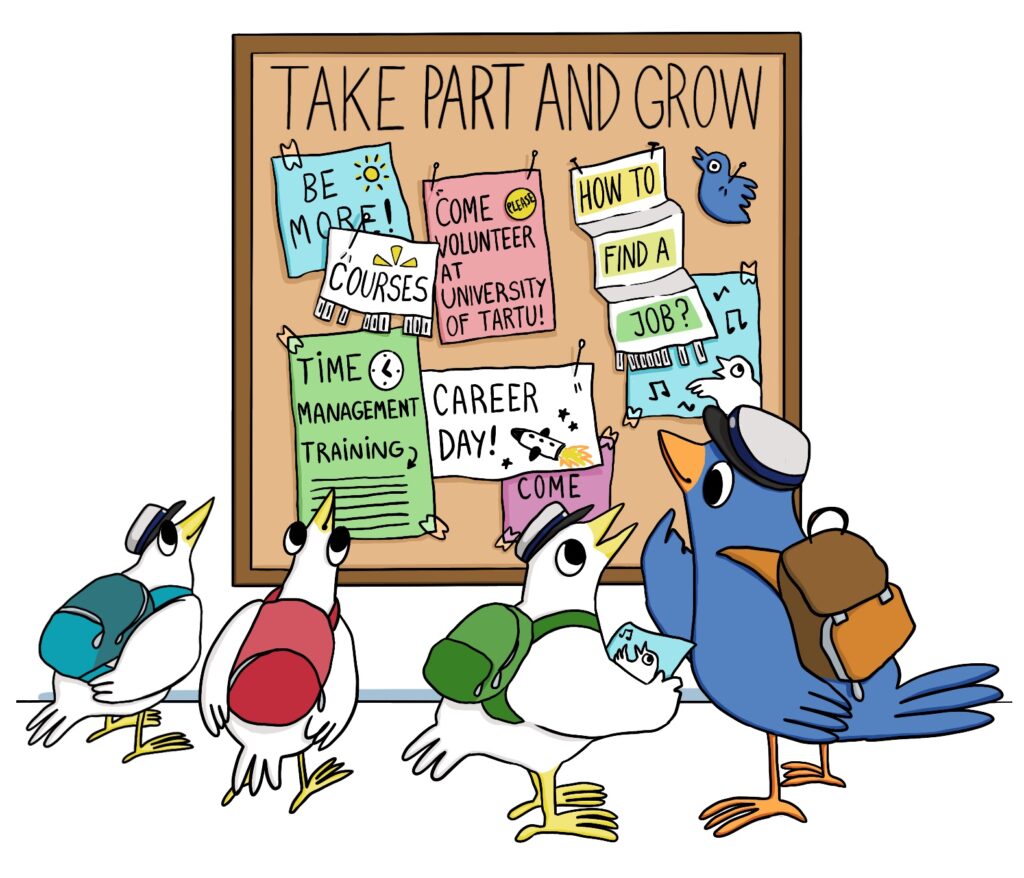- Career Hub
- Future Skills
- Academic planning
- Planning further studies
- Planning your studies
- How to manage your studies?
- How to plan for your studies?
- How much freedom do you have to modify your studies?
- When to make learning choices within the curriculum?
- How little or how much can you study?
- How can you concentrate on and manage the time of studies?
- How to change specialisations?
- How to study well?
- Internship
- International experience
- Work-life development
- Act and grow
Self-development opportunities outside the university

Outside the university, there’s a world full of opportunities waiting for you to explore and grow.
Volunteering is a great way to give back while gaining valuable experience across different fields. Whether you’re promoting the University of Tartu Foundation, diving into photography, organising events, or lending a hand at a construction camp in scenic Soomaa — volunteering helps you develop new skills and expand your network in meaningful ways.
Traineeships are an important and exciting part of your academic journey — whether they’re compulsory or optional. A traineeship focused on your specialisation gives you the chance to put your knowledge into practice, sharpen your skills, and build valuable professional connections. You can also explore project-based internship opportunities through the Futulab platform, where you’ll find a wide range of placements designed to support your development and future career.
Getting involved in event planning with a student organisation can be a highly rewarding experience. It’s a great way to build your skills in planning, teamwork and communication — all of which will benefit you in both your studies and future career.
Don’t underestimate the power of podcasts — they’re a fun and easy way to learn while doing other things. Whether you’re walking, commuting, or cooking, you can continue to expand your knowledge without slowing down.
There are countless interesting blogs on a variety of topics, and exploring those popular among thought leaders in your field can be a great source of inspiration. Just remember to stay critical: not everything online is reliable. Taking a moment to evaluate your sources helps you get the most out of what you read or listen to.
The professional world offers a wide range of exciting opportunities — including project-based work that can last from a few months to several years. Even short-term projects can be eye-opening, helping you grow and build meaningful connections. Working while studying — even outside your main field — can also be a rewarding experience. It helps you develop valuable skills such as teamwork, critical thinking, communication, and negotiation. If you decide to combine work and studies, good time management is essential. For helpful tips on how to make it work, check out the “Work-life development” section.
Your hobbies matter, too! Whether it’s playing sports, reading, writing a blog, singing, dancing, exploring nature, or travelling — the things you enjoy in your free time add meaning to your life, support your well-being, and help you grow.
In short, remember: every experience you take part in helps you grow. Stay curious about the opportunities around you, notice how you change when you step out of your comfort zone, and think about how the skills you gain today can shape your future. Developing a growth mindset is one of the most powerful things you can do — it opens the door to endless possibilities. Keep exploring — your next adventure is just around the corner.
